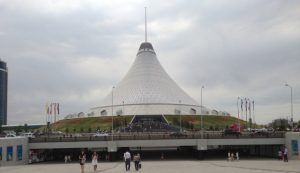 Nuclear Abolition NewsViewpoint | ICAN
Nuclear Abolition NewsViewpoint | ICAN
By JOHN LORETZ*
In the late 1980s, IPPNW helped bridge a dangerous and divided world to connect grassroots activists who wanted to stop nuclear testing by the United States and the former Soviet Union. Those “activists” were, in fact, ordinary people whose lives had been damaged (and sometimes taken from them) and whose communities had been destroyed by the contamination from nuclear weapons tests, which continued underground long after the Partial Test Ban Treaty outlawed them in the atmosphere, under water, and in space in 1963.
The Nevada-Semipalatinsk Antinuclear Movement, the creation of Kazakh poet Olzhas Suleimenov, began to demonstrate at the Soviet test site in 1989, in solidarity with US protesters at the Nevada Test Site. After meeting with Suleimenov, IPPNW co-sponsored the International Citizens Congress for a Nuclear Test Ban in Alma-Ata and Semipalatinsk, where 300 delegates, joined by 20,000 “ordinary people,” called for the closure of the test sites. The Soviet government cancelled a whole series of tests in response and, in August 1991, the President of Kazakhstan closed Semipalatinsk. Within months, Mikhail Gorbachev declared a moratorium on Soviet tests, and the US followed in 1992. That moratorium, now global with a few obvious exceptions, has held ever since—a direct result of informed, impassioned, and massive citizen action.
Following the collapse of the Soviet Union, Kazakhstan renounced nuclear weapons altogether and, along with Ukraine and Belarus, returned the warheads and missiles based on its territory to Russia.
This month (25-30 August), IPPNW will return to Kazakhstan, where it will convene its 21st World Congress in the capital, Astana. The theme is “From a nuclear test ban to a nuclear-weapon-free world,” and if that sounds familiar to ICAN campaigners, it’s no coincidence. ICAN’s humanitarian case for a global treaty to ban nuclear weapons and to achieve their elimination will be at the heart of the Congress program, presented in plenaries and workshops where our national affiliates and their members will be given the tools and inspiration they need to make the most effective contribution possible to ICAN’s preparations for Vienna and beyond.
In addition to presentations on the medical consequences of nuclear war, including nuclear famine and health effects of exposure to ionizing radiation—perennial topics at an IPPNW meeting—plenaries and workshops will feature presentations on the Vienna conference on the Humanitarian Impact of Nuclear Weapons; the new UNIDIR study on the inability to mount any meaningful emergency and relief response to the use of nuclear weapons; the Action Plan adopted by the International Red Cross Red Crescent Movement; an examination of the impact of the nuclear chain on health, the environment, and security; a scientific panel on the long term health and ecological consequences of the nuclear tests at Semipalatinsk; and an exploration of possible political and diplomatic processes for nuclear abolition. The complete program is available on the Congress website.
When IPPNW launched ICAN in 2007, our intent was to create the foundations for a broad-based campaign built on humanitarian principles that could bring decades of struggle for a nuclear-weapons-free world to a successful conclusion. In a few short years, ICAN has taken major strides toward that goal. Our pledge going into Astana is to complete this task with our ICAN partners, starting with getting a ban treaty in about the same amount of time it took our Kazakh friends to close their nuclear test site once they had put their minds to it. Think we can do it?
*John Loretz has worked on behalf of peace, disarmament, and environment organizations for more than three decades. As IPPNW’s Program Director, since 2000, he is responsible for coordinating the federation’s work on the medical and humanitarian consequences of nuclear weapons and the public health and environmental dangers of nuclear energy. He represents IPPNW on the core group of ICAN — the International Campaign to Abolish Nuclear Weapons. As a nuclear policy expert, he has joined physician delegations in Europe, Asia, and Africa, and coordinates IPPNW’s participation at major UN-based meetings on nuclear weapons and disarmament. John has written and spoken extensively on nuclear issues, and is a regular contributor to IPPNW’s Peace and Health Blog. and other publications. A graduate of Boston College with an MA from the University of Virginia, John was Communications Director for Women’s Action for Nuclear Disarmament (WAND) in the early 1980s and at IPPNW’s US affiliate, Physicians for Social Responsibility, in Washington, DC, from 1986-1990. He was the Executive Editor of IPPNW’s journal, Medicine & Global Survival, from 1995 until it ceased publication in 2002.






